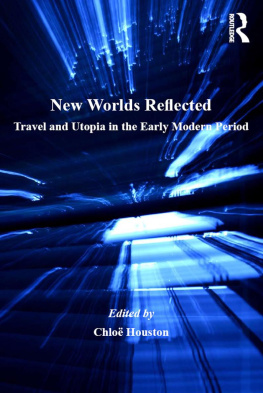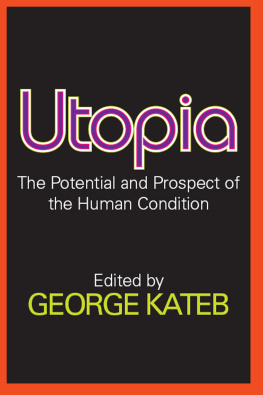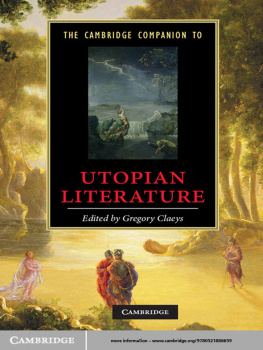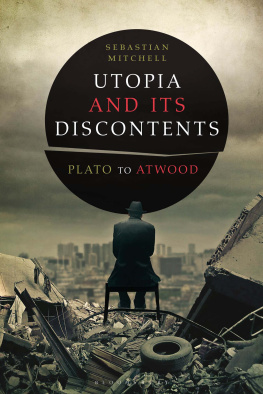
Journey through Utopia: A Critical Examination of Imagined Worlds in Western Literature
Marie Louise Berneri
This edition 2019 PM Press
All rights reserved. No part of this book may be transmitted by any means without permission in writing from the publisher.
ISBN: 978-1-62963-646-7
Library of Congress Control Number: 2018949080
Cover by John Yates / www.stealworks.com
Interior design by briandesign
10 9 8 7 6 5 4 3 2 1
PM Press
PO Box 23912
Oakland, CA 94623
www.pmpress.org
Printed in the USA.

Marie Louise Berneri 1918-1949
BIOGRAPHICAL NOTE
Marie Louise Berneri was born in Arezzo (near Florence) on March 1st 1918. Eight years later her family had to flee from persecution by the Fascists and the next eleven years were spent in Paris. During these formative years she developed her interest in political and social questions and in child psychology, which she studied at the Sorbonne.
In 1937, and until her sudden death, following a short illness, on April 13th 1949, she lived in London. During these years her principal unpaid activity was in political journalism in the cause of anarchism. She was joint editor of the journals published by Freedom Press: Spain & the World (1937-39), War Commentary (1939-45) and Freedom from 1945 until a month before her death. She was specially interested in the aspects of social revolution and her Workers in Stalins Russia first published by Freedom Press in 1944 was an immediate success. She also wrote extensively on the Spanish Revolution but never had the time to produce a volume of conclusions on that epic struggle. With her fluent knowledge of four languages she maintained an extensive correspondence with anarchists and sympathisers throughout the world, but she also spent many hours attending political meetings, and selling our literature at demonstrations, meetings and every Sunday at Speakers Corner, Marble Arch in London.
Contents
The Black Rose of Anarchism: Marie Louise Berneri
Matthew S. Adams
Marie Louise Berneri was evidently the kind of person who inspired verse. In the Gedenkschrift published in 1949, the year of her tragically early death, Louis Adeane attempted to capture the grief felt by those that she had left behind:
Into the silence of the sun
Risen in dust the rose is gone,
The blood that burned along the briar
Branches invisibly on the air
A child walks in her grace
The light glows on his face,
Where the great rose has burned away
Within the terrible silence of the day.1
These feelings were shared by Adeanes friend George Woodcock, the future historian of anarchism, who identified in Berneri a mental affinity that blossomed into a firm friendship as he entered Britains burgeoning anarchist movement in the 1940s.2 He too looked to poetry to explain what Berneri had meant to him, but only long after the shock of her death had faded. Indeed, Woodcock, whose intellectual apprenticeship was as a poet frustrated by the limited publishing outlets in 1930s London, later identified Berneris death as the cause of the twenty-five-year loss of his poetic voice. My sudden inability to write lyric or elegiac poetry coincided with her death, he reflected later, and I was convinced that the emotional shock was the cause of this block.3
With the muse returned, he too reached for the floral metaphors of the romantics to memorialise Berneri and reflect on his reluctant creative silence:
This is the black
rose of memory.
It has taken
a long time
to spring from
the briar of
silence.
What could I say,
heart clogged with grief,
the muse departed?
Despair is
inarticulate.
and I became
a silent poet.
Regaining his voice, he offered the black/rose of memory to the long-departed Berneri, noting that Its colour/will never offend/an anarchist shade,/and in its dark heart/you live in your/brightness and beauty.4
Appreciations such as these indicate the emotional shock of Berneris untimely death and the force of her personality, but her comrades also mourned the loss of a figure who had played a vital role in revitalising British anarchism. The volume in which Adeanes verse appeared, Marie Louise Berneri 1918-1949: A Tribute, while defined by the sadness of its purpose, ruminated on these manifold contributions as well as her extraordinary life. Where one of the schisms in this movement was a tension between the intellectual and practicalcaptured in the mutual antagonism between the bourgeois, careerist, misinformed Professor Woodcock, as Albert Meltzer described him, on the one hand, and, returning the compliment, Woodcocks appraisal of Meltzer as a pompous young man of undefined education, on the otherBerneri managed to transcend such divisions, combining commitment to anarchist activism with an intellectual curiosity and adventurousness.5 She threw herself, one refugee observed, into aiding those who had fled Spain for Britain as the revolutionary experiment foundered on the rocks of fascist reaction; raised funds for a colony of orphaned children on the north-eastern tip of the Spanish coast, and, a good and spontaneous speaker, often publicly preached the virtues of anarchism.6 At the same time, she was a committed propagandist for anarchist ideas: writing critical articles exploring the rapidly changing geopolitics of the 1930s and 1940s, and thereby offering a distinctive anarchist response to current affairs, as rival ideologies crowded the world stage. In effect, the practical and intellectual aspects of her contribution to the anarchist cause met in this output. Through her involvement with Freedom Press, she helped organise funding and undertook editorial work for the newspaper Spain and the World, its heir Revolt! and, in turn, became the driving force behind its successor War Commentary. Berneris brief life was thus defined by a devotion to anarchist politics in all its manifestations.
Her seminal intellectual achievement, however, was Journey through Utopia, posthumously published in 1950. A comprehensive survey of utopian literature from Plato to Aldous Huxley, Berneri did not intend her book to be a simple exploration of the richness of the utopian stance through history, but rather a warning and a reminderif it were needed in the mid-centurythat freedom of thought did not necessarily translate to freedom in the speculative visions of writers and intellectuals. For this reason, as Herbert Read noted in a review of the book, Berneris achievement should stand alongside a work like Peter Kropotkins Mutual Aid as evidence of an expansive intellect showing the relevance of anarchist principles to issues outside the traditional confines of anarchist theory. What we require, he wrote, now that anarchist principles have been adequately defined, is a general orientation towards the sociology of knowledge.7 Lest this sound too desiccated for the passionate and experimental politics of anarchism, Read added that utopian speculation had always been the proving ground for social advancement. The shining utopian visions of today may not be actualised tomorrow, but perhaps the societies that are to come will bask in the furtive, sun-dappled light of the utopias of yesterday. For this reason, Read thought that the utopian imagination was vital, if only to clarify those social arrangements that were patently the enemies of freedom of thought and action. Berneri would have agreed. Meaningful freedom should be our index of success, and this was, for her, a commitment that ran deeply and started early.
Next page








